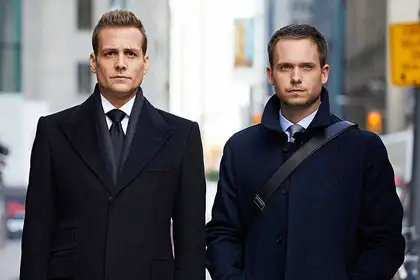
Despite all they have taught us about the benefits of co-leadership, Harvey and Mike still struggle to break away from "hero-leader", which belongs in a by-gone age, says Dr Ralph Bathurst.
Welcome to the last in a series of six articles on leadership by Dr Ralph Bathurst, who is the academic coordinator for Massey’s Master of Advanced Leadership programme. Each week he has explored aspects of the concept of co-leadership, using the characters from popular tv series Suits.
Read Article 1: What Suits teaches us about better leadership models
Read Article 2: Suits: Co-leading with the head and heart
Read Article 3: Suits: Leadership and play
Read Article 4: Co-leadership and gender in the workplace
Read Article 5: Suits: Leadership for the age of access
My discussions of co-leadership based on ideas found in the TV series Suits has left some loose ends that call for discussion. To get there I want to go to the last episode to be aired to date (Season 7, Episode 16 – spoiler alert!) and ask the question: What is the future of co-leadership?
The plot lines in Suits do not give an optimistic view; instead it appears that the forms of leadership appropriate to this digital age have not yet advanced beyond their infancy. But I am getting ahead of myself.
In the final episode, Mike is working a pro bono class-action case on behalf of the law clinic he has been involved with as a volunteer. A company that manufactures batteries has allowed lead to leach into the soils of a nearby school. Many of the students are showing signs of lead poisoning and Mike intends that the company acknowledges and pays compensation to affected families. The company had replaced the soils around the school; it literally tried to cover its tracks by removing contaminants and avoided admitting liability.
The story of corporate corruption and environmental abuses resonates globally and at one level this episode plays out another version of Erin Brockovich, yet there are other subplots at work.
Lead poisoning in all its forms
It is no accident that lead poisoning is the focus, because students in the United States regularly face another kind of lead poisoning: campus shootings. There is little appetite to deal with the problems of gun violence because of the deep connections between the National Rifle Association and politicians who rely on NRA monies to fund their campaigns and support them while in office. The current President is advocating for specially-qualified teachers to carry weapons so they can defend their students in the face of future attacks. This is clearly absurd, and will not deal with the poison that is contaminating the environment, literally and figuratively.
As with the issue that Mike is trying to solve, corporations can have a role to play in cleaning up this problem, but first there must be an admission of guilt. He plays a card that Suits has already used to great effect: he reprises A Few Good Men, as he did in a previous episode where he advised Rachel on her first courtroom battle.
In the movie, Daniel Kaffee (Tom Cruise) is sure to lose the case unless he can get Colonel Jessup (Jack Nicholson) to confess to ordering a “code red”. In the heat of the moment Jessup admits to giving the order.
In all these scenes, the powerful buckle under the intense interrogations of less experienced lawyers. However, the problem with the plotline is that it draws on the hero-leader motif. Whether female (Rachel) or male (Mike), it is the same narrative of the little person triumphing (David) over the big guy (Goliath). But this is a story from a by-gone age.

Dr Ralph Bathurst.
What of this digital age?
In earlier episodes Donna is given a digital device that speaks with her voice. A boffin from the basement has devised a product that can replicate human intelligence. It learns to speak like Donna, including her witticisms, because it has the capacity to take all Donna’s dialogue and build up sufficient memory of her responses to situations, ultimately being able to speak for her. Harvey is bemused and wonders if the device can have the same emotional intelligence as humans. The designer assures him it can because of the continual feedback loop built into the software. The device may chart a new direction for the way organisations could be managed: by artificial intelligence.
Suits experiments with the idea for several episodes but abandons it, perhaps because the viewing public is not yet ready to explore the actualities of the digital age. Certainly there are a plethora of movies and TV series that focus on artificial intelligence, casting it within an apocalyptic frame.
What would leadership look like in this digital age, incorporating artificial intelligence? If there is still need for leaders, how might they be educated?
There have been recent calls for business schools to be “demolished” because of their irrelevance. I disagree, but certainly curricula need to change. Studies need to focus on emotional intelligence, including the communication skills necessary to achieve authenticity and presence. But developing these soft skills is hard work!
Computer coding, design skills and a comprehensive knowledge of the arts must stand alongside traditional business subjects. Organisations of the future will be quite different from today’s and the world needs women and men who are flexible thinkers who can work together bringing all their skills in collaboration to address pressing problems; and this can only occur if they develop a comprehensive repertoire in school, including independent thinking, critical analysis, and wisdom.
The pathways of the past of an individual climbing the hierarchical ladder are no longer appropriate, and the business sector needs to grasp the needs of this age. Conservative leadership constructs must be abandoned, and we need together to find ways of embracing the technological advancements of the digital age while at the same time building the emotional intelligence necessary for the future of collaborative leading. The future generation of co-leaders is in school right now. Let us make sure they are equipped for the demands that the future places on them.